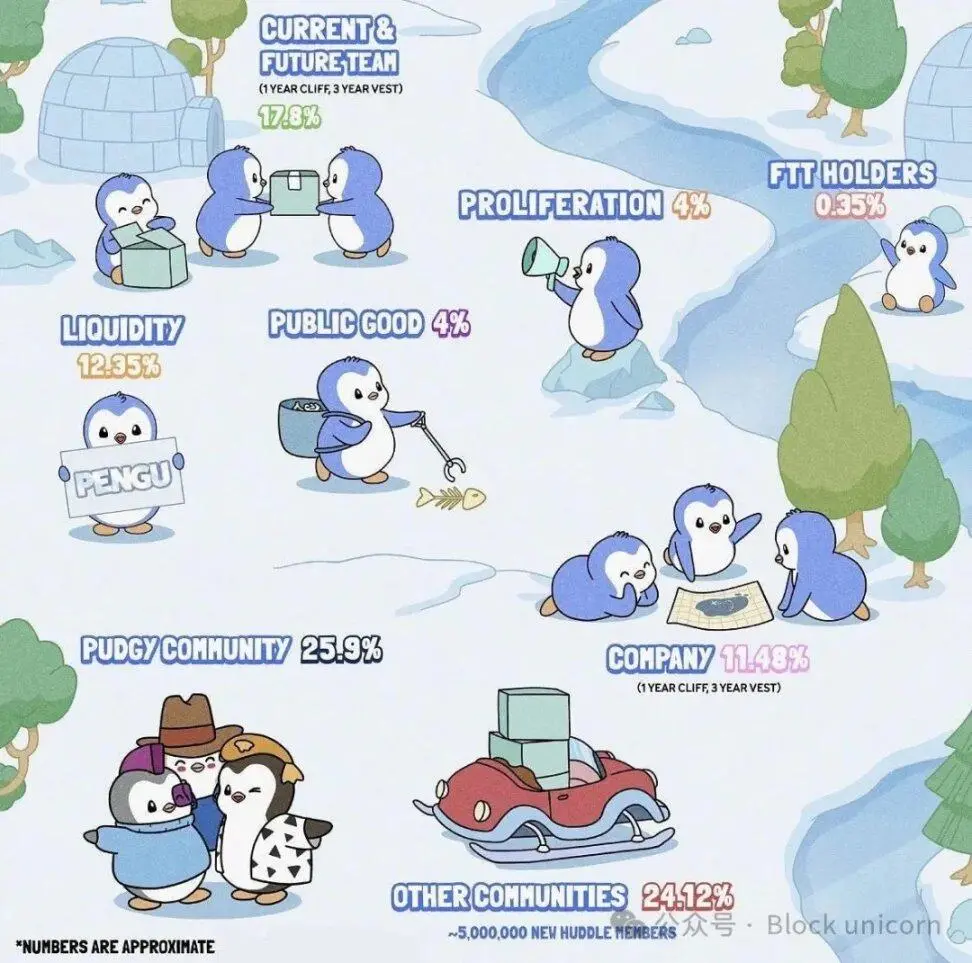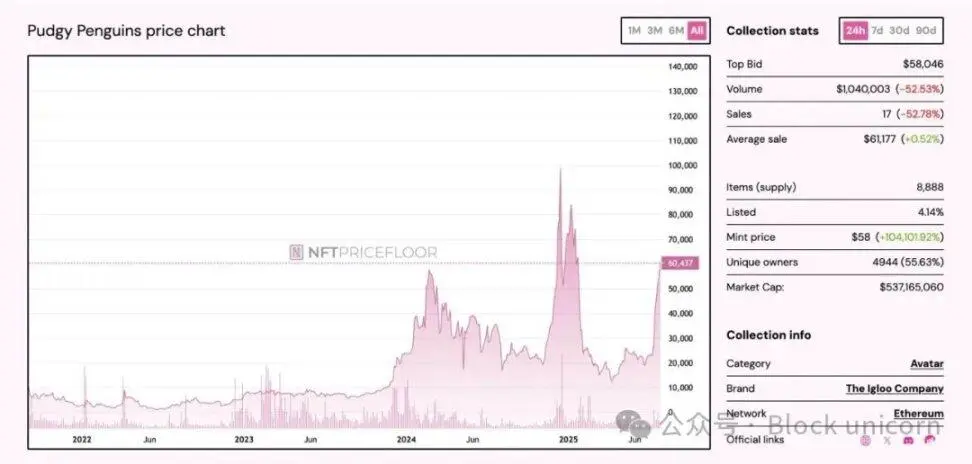From Wandering Teenager to Billionaire: Luca Netz's Path to Success with the Fat Penguin
Original title: "The Story of Fat Penguin CEO Luca Netz"
Written by: Thejaswini M A
Compiled by: Block unicorn
preface
Boxes at Ring distribution centers don't pack themselves, but 16-year-old Luca Netz is always distracted. Around him, colleagues skillfully and efficiently complete their shifts. But Netz was preoccupied with how to turn a startup into a $1 billion acquisition company.
He dropped out of school for this warehouse job, spent most of his childhood sleeping wherever his mother could find, and now, he has seen firsthand how companies can really create wealth.
This experience taught him how startups scale, how they consume money, and how they struggle to survive to reach escape speed.
Years later, when Netz bets $2.5 million on a set of cartoon penguins considered worthless by most people, the class proves invaluable. Today, these penguins sit on the shelves of Walmart, and the once-homeless Los Angeles teenager is now one of the most influential builders in the crypto space, worth over $100 million at the age of 25.
"We were homeless for about ten years," Netz recalls calmly. "We have lived all over the world, from South Africa to Paris, London, New York, to Los Angeles. As long as my mother can muster up the courage, we will continue to live like this."
The growth of scammers
Netz's mother, an undocumented immigrant from France, speaks little English and struggles to find stable employment. They constantly move, live with friends, acquaintances, and sometimes even strangers who are willing to take them in temporarily. For little Luca, home is where they happen to sleep that week.
Most people would see such a growth experience as a hindrance. Nets learned to see it as an education. Constant displacement taught him adaptability. Uncertainty trains him to spot opportunities that others overlook. Hunger taught him to act quickly when the opportunity came.
By middle school, Netz discovered a simple truth: his classmates were willing to pay more for convenience rather than walk to Burger King. So, he started buying chicken sandwiches and snacks and selling them from his backpack at a markup. Simple math, but effective.
When Netz was twelve, his family finally settled in central Los Angeles. It was there that he got his first taste of settling down. The constant relocation stopped, at least for a few years.
At the age of sixteen, Netz dropped out of high school and printed a hundred resumes. He then walked all over Santa Monica's tech streets, going door to door to every startup he could find, as if he were campaigning for something.
Ring hired him. It was 2015, and the smart doorbell company had only twenty employees and big dreams. Netz starts in the warehouse – packing boxes, processing orders – a job that most people don't think much about. But he's focused on things that go far beyond that: funding rounds, hiring booms, and how problems are solved (or not).
He has seen Ring grow from a humble startup to a billion-dollar acquisition target for Amazon. While he was packing the boxes, venture capital flocked to him. While he was processing orders, the company expanded. He received an education in startup mechanics that the general mainstream MBA program cannot provide.
"I was able to see a company go from raising a million dollars to becoming a billion-dollar company," Netz recalled.
Jin Lian had an epiphany
While working at Ring, 16-year-old Netz began noticing a strange phenomenon in hip-hop culture. Rappers will spend tens of thousands or even hundreds of thousands of dollars on gold chains and diamond jewelry. But upon closer inspection, he found that most fans couldn't tell the difference between a $100,000 gold chain and a $200 gilded replica.
This observation became the basis for his first real business. Netz found suppliers supplying gold-plated chains and cubic zirconia diamonds, which looked almost identical to the expensive versions. Then he devised a marketing strategy that was both simple and ingenious: he would pay $50 to $100 to the popular rapper's fan page to promote his jewelry.
"Every time I paid them, they posted my promotion, and we made $1000 to $2000 or even $5000 back every time," he recalls. With such a high ROI, he can instantly reinvest profits and expand aggressively.
Nine months after launching his dropshipping business on Shopify, Netz achieved his first million-dollar revenue. He was 18 years old. Eventually, he sold his jewelry business for $8 million, which provided him with capital to pursue larger goals.
With money in the bank, Netz began diversifying, using the social media marketing experience he had gained in his jewelry business. He served as the Chief Marketing Officer of Von Dutch, an iconic clothing brand, gaining experience managing established brands.
He then became the CMO and major investor of Gel Blaster, a toy company that produced toy guns based on Orbeez. Under his marketing leadership, Gel Blaster achieved significant market success and was named "North America's Fastest Growing Toy Company" by trade publications.
But the universe has something cuter in store for him.
Penguin rescue
At the beginning of 2022, the NFT market was still high due to the previous year's outbreak. Digital artwork sells for millions of dollars, celebrities swap out their avatars for cartoon apes, and new projects are launched every day, promising the next Disney.
One of them is Pudgy Penguins, a collection of 8,888 cartoon penguin NFTs that have attracted attention with their cute designs and strong community. But by January 2022, the project was in crisis. The original founders promised too much and underdelivered, and the roadmap project was not delivered. There are allegations of financial mismanagement and the collapse of community trust.
On January 6, 2022, the community voted to expel the initial founders. On the same day, Netz publicly offered to buy the entire Pudgy Penguins collection and its intellectual property for 750 ETH (about $2.5 million at the time).
This is not an easy decision. The acquisition comes a week before the NFT market enters a two-year bear market. Netz and his executive team raised funds for the acquisition and worked unpaid for a year, while investing another $500,000 of their own funds to keep the project alive.
What attracts him is the potential to build a lasting brand. "If I closed my eyes and couldn't imagine Pudgy Penguins becoming a billion-dollar brand, I would never buy it," he said.
Go beyond digital collectibles
Most people thought that Netz would resell Pudgy Penguins to clean up the pieces and drive up the floor price before selling them to the next buyer. However, he completely ignored the NFT market.
Under the leadership of Igloo Inc., Pudgy Penguins has become an unprecedented brand: a crypto brand that operates in the real world. Netz established six revenue streams: digital experiences, physical products, licensing deals, content creation, film and television development, and gaming. These penguins are no longer just avatars, but characters in a larger story.
The strategy of physical products seems crazy at first. Will crypto enthusiasts buy cartoon penguin plush toys? But Netz is not targeting crypto enthusiasts, but Walmart parents.
Each plush toy comes with a QR code that directs buyers to "Pudgy World," a digital space where users can obtain crypto wallets and claim NFT wearables.
Pudgy World is a free 3D browser game where players can customize penguin avatars and explore virtual worlds using their NFTs and physical toys, seamlessly integrating Web 3 ownership with accessible gameplay. Parents thought they were buying a plush toy for their child, but in fact they were unknowingly entering Web 3.
The success of this strategy exceeded everyone's expectations. Pudgy Penguins toys are now on the shelves of Walmart, Target, Chuck E. Cheese, Amazon, and Walgreens. Over 1.5 million toys have been sold, with over $10 million in revenue in one year.
While other NFT projects collapsed or desperately transformed, Pudgy Penguins quietly became a crypto brand that could survive without relying on cryptocurrencies.

Token issuance
On December 13, 2024, Netz airdropped $1.5 billion worth of PENGU tokens to the wallets of millions of users in the crypto ecosystem. This is the largest airdrop in Solana's history. He chose Solana for its lower transaction fees and higher throughput to maximize accessibility.
25.9% of the tokens are allocated to the Pudgy Penguin community, 24.12% to other communities and newcomers to join, and the rest is divided between team members (with lock-up periods), liquidity provision, and company reserves.

The issuance has sparked heated debate in the crypto community. Some praised the broad democratization of distribution for the project's success. Others criticized the distribution of tokens to millions of wallets instead of centralizing rewards to long-term holders.
Netz defended this strategy: "I'm not trying to issue a $2 billion token and stop there forever. What I want to chase is the real giant. What I'm chasing is Dogecoin." He argues that for PENGU to reach the scale of a full-fledged meme coin like Dogecoin, it needs an launch story that resonates with mainstream audiences.
Since its launch, PENGU's movement has validated some of Netz's bold predictions. PENGU debuted with a market capitalization of around $2.3 billion and subsequently experienced the typical volatility of large token launches, first falling sharply before eventually finding support. The token has been consolidating between key price levels for months, setting the stage for a subsequent significant rally.

By mid-2025, PENGU surged over 300% in just a few weeks, surpassing $2.5 billion in market capitalization as large accumulation increased and daily trading volume exceeded $2.5 billion.
This rally is driven by multiple catalysts, showcasing the ecosystem's growing mainstream appeal. The most significant driver is Canary Capital's groundbreaking PENGU/NFT-themed ETF application filed with the SEC. This institutional validation has sparked significant FOMO in the market, indicating that traditional finance is starting to focus on the Pudgy Penguins ecosystem. The accumulation of large investors provides the technical foundation for the rally, with over 200 million PENGU tokens acquired since July alone, and the surge in trading volume reflects strong interest from both institutional and retail investors.

Strategic collaborations with mainstream brands, including NASCAR, Lufthansa, and Suplay Inc., have led to unprecedented exposure beyond the crypto circle. The ongoing rumors about Pudgy Penguins' potential acquisition of OpenSea have further ignited the speculative frenzy, although the team has since denied them.
Meanwhile, the original NFT collection maintained a strong performance, with floor prices stabilizing at 15-16 ETH, markedly recovering from bear market lows, validating Netz's strategy to create lasting value beyond short-term hype.

Build a consumer blockchain
In January 2025, Abstract was launched as Netz's boldest bet to date: a blockchain that doesn't look like a blockchain. No wallet setup. There are no seed phrases that need to be stored. There are no gas fees to calculate. Users can start trading without knowing they are using blockchain technology.
According to Netz, the blockchain itself is the most uninteresting part of Abstract. In his opinion, consumers will not go on the chain unless they have a reason to do so, and unless the friction disappears. Most importantly, he wants Abstract to be fun, allowing people to play games, collect digital items, and interact with apps without having to think about the underlying technology.
This vision attracted $11 million in investment from the Founders Fund and other top investors. Abstract launched with over 100 apps and more than 400 in development. These are not DeFi protocols or trading platforms, but gaming, music, sports, and fashion applications that run on the blockchain.
This ambition reflects the man behind it. Netz works 12 hours a day, six days a week, from 8 a.m. to 8 p.m., with no holidays. The only break is between 6 and 8 p.m., which he calls "critical thinking time" to work on the day's affairs and plan for tomorrow's execution.
Abstract could be the platform that will eventually bring crypto to mainstream consumers. Or it could be another costly lesson in the gap between vision and reality. For Netz, the discomfort of not knowing how it turned out was the point.
A vision for the future
Netz has his own theory of the future. Traditional brands sell products to consumers, and transactions end at the checkout. NFTs completely reverse this model. Instead of customers, you get participants; Not buyers, but stakeholders who share the benefits with the brand's success.
This mechanism creates unprecedented synergies. When Pudgy Penguin holders promote a brand, they become investors protecting their assets by default. When these toys hit Walmart, every NFT holder was a winner. It is a kind of capitalism that involves all participants.
But Netz wasn't thinking about quarterly earnings. He was planning for decades. The full experience of Pudgy World, with hundreds of thousands of accounts created after 18 months of development, is coming soon. He plans to actively expand into the Asia-Pacific market, betting that the next crypto boom will emerge from the East.
At the age of 25, Luca Netz stands at the intersection of two worlds that shouldn't have collided. On one side is the chaotic speculative world of cryptocurrencies, where wealth can evaporate in minutes; On the other side are the slow-moving machines of traditional retail, and gaining shelf space at Walmart requires months of negotiation and a solid track record.
Most people would choose one side, but Netz built a bridge.
He knows that the future is not about choosing between digital and physical, community and business, innovation and accessibility, but about proving that they are never opposites.
Each Pudgy Penguin toy sold at Target comes with a QR code that unlocks a digital world. Each PENGU token traded represents brand ownership that exists in both blockchain code and retail merchandise. Every Abstract user who signs up only with email unknowingly enters the future of finance.
This is the revolution of the Nets. Make the impossible inevitable. Instead of disrupting industries, he taught them to talk to each other.
In the short history of cryptocurrencies, most success stories have followed a familiar arc: technological breakthroughs, venture capital, explosive growth, and eventual decline. Netz wrote different scripts. He turned the industry's biggest weakness – opaque to the average person – into his competitive advantage.
Some entrepreneurs create companies. Others create movements. Netz created a new category of existence. A digital ownership feels as natural as holding a stuffed animal, with global communities formed around shared joy rather than shared interests, and the most sophisticated technologies hidden behind the simplest experiences.
